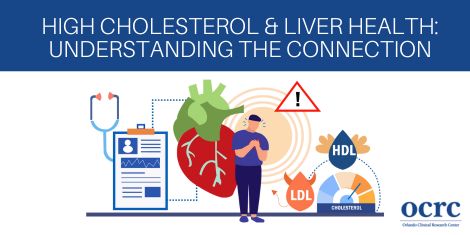
In the United States, approximately 4.5 million adults have been diagnosed with liver disease, but millions more could be struggling with fatty liver disease without realizing it. These illnesses not only impact liver health, they can be difficult to manage once they’ve begun and also put your life at risk.
But why does this condition affect so many people? Scientists are zeroing in on one particular factor that could be impacting liver health: cholesterol levels. Learn more about how your cholesterol levels play a vital role in conditions such as non-alcoholic fatty liver disease.
The liver is an organ that has numerous functions, including regulating cholesterol levels. The liver itself produces cholesterol, which is essential for cell membranes as well as the synthesis of vitamin D and your hormones.
Your liver synthesizes high-density lipoproteins (HDL), also known as “good” cholesterol. HDL has earned this name because it helps to carry other types of cholesterol from all over your body to your liver. Another protein the organ synthesizes is low-density lipoproteins (LDL). This is “bad” cholesterol that can build up in your arteries.
The liver converts cholesterol into bile salts and removes them from your body. This helps to reduce its levels in your bloodstream.
Your liver works hard to remove cholesterol from your blood, but when levels remain high for too long, it cannot process all the fat efficiently. The excess fat stays in liver cells, disrupting the organ’s ability to function and causing gradual damage.
This process can lead to non-alcoholic fatty liver disease (NAFLD), a condition especially common in people who are overweight or obese. It can also affect individuals with risk factors such as type 2 diabetes, high blood pressure, or metabolic syndrome. One of the most challenging aspects of NAFLD is that it often progresses silently and causes no symptoms in its earliest stages.
Some people experience fatigue and pain in the upper-right belly area. Without timely treatment, NAFLD can advance to nonalcoholic steatohepatitis (NASH), which causes liver swelling and scarring known as fibrosis. High cholesterol can further trigger immune responses that worsen inflammation and result in additional scarring. As fibrosis progresses, the disease can reach its most severe stage, cirrhosis.
Excess cholesterol can also impair the function of hepatic macrophages, the liver’s immune cells. When these cells do not work properly, inflammation and scarring may continue even after cholesterol levels improve.
There are several clinical trials that are focused on liver health and finding the most effective ways of treating NAFLD and NASH. Scientists are investigating whether semaglutide can help with NASH fibrosis. Semaglutide is a GLP-1 receptor agonist that has shown promise in helping to lower inflammation in the liver without worsening scarring.
Another treatment option under consideration involves obeticholic acid, which can help reduce fat in the liver. It can regulate bile acid, glucose metabolism, and lipids. It can combat fibrosis, too.
For those suffering from NASH, scientists are seeing promising results in SGLT2 inhibitors, like dapagliflozin. It can help reduce liver fat and improve liver function, while also managing body weight.
At Orlando Clinical Research Center, we’re currently running several clinical trials focused on understanding how the liver processes certain drugs. Many of our studies compare the impact that the medications have on healthy vs. damaged livers. With this information, scientists strive to understand the best pathways for treating NAFLD.
We encourage people with liver disease to consider joining available trials. At Orlando Clinical Research Center, we offer state-of-the-art facilities that provide comfort to volunteers and dependable results for pharmaceutical companies and scientists.
If you’re living with liver disease, or seeking a site to conduct new treatment studies, our team is here to help. We can host Phase I-IV clinical trials in a large and welcoming facility. Contact us to learn more about our capabilities and current clinical studies.
